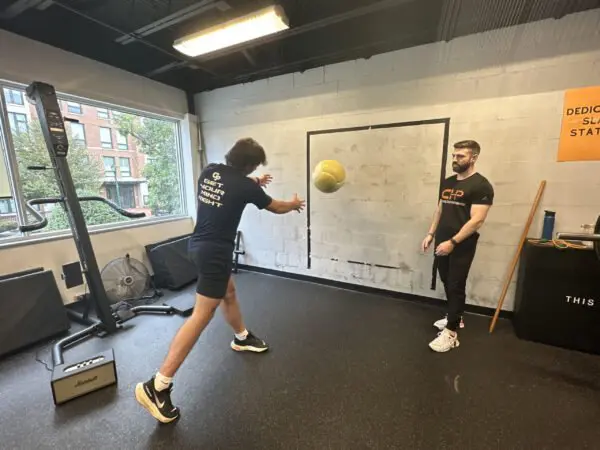Lately, I’ve noticed a nice change.
High school athletes better understand the importance of sports training during their off-season(s), most notably during the summer.
What a relief! In the past, I spent countless hours teaching my physical therapy clients about the importance of participating in a well-designed sports training program after they’ve hit puberty.
But now there is a new challenge.
Choosing the right performance program!
Young athletes have many different options, including different programs, coaches, companies, etc. So, how do you know which option is best?
Start by understanding the design of the sports performance program and who is directing it.
The Coach
When selecting a coach for your athlete, it’s crucial to prioritize experience, qualifications, and expertise. A coach should possess a deep understanding of athletes across various skill levels and abilities. This breadth of experience ensures that they can tailor their approach to meet the unique needs of each individual under their guidance. Moreover, qualifications play a pivotal role in ensuring the efficacy of the training program. Look for coaches who have obtained a college degree in a relevant field such as Kinesiology or exercise science. These degrees provide a solid foundation of knowledge in human movement, physiology, and sports performance.
Furthermore, certifications like the CSCS (Certified Strength and Conditioning Specialist) indicate that the coach has undergone rigorous training and testing in the principles of strength and conditioning. This certification ensures that they are well-equipped to design and implement effective training programs that prioritize safety and performance optimization. Additionally, access to a quality sports physical therapist can be invaluable in preventing injuries and addressing any underlying issues that may impact athletic performance. By prioritizing these qualifications and resources, you can ensure that your athlete receives the highest standard of coaching and support to achieve their goals.
The Program
When considering a training program for your athlete, it’s essential to evaluate its components to ensure comprehensive development and optimal results. Here are key elements that every program should encompass:
Goal Setting: Effective coaching begins with a clear understanding of the athlete’s objectives. Coaches must align training strategies with the athlete’s goals to measure success accurately. Without defined goals, progress evaluation becomes challenging.
Testing: A thorough assessment of the athlete’s current abilities is fundamental. Identifying strengths and weaknesses through objective metrics lays the groundwork for tailored training plans. Quantifiable data provides insights into progress and informs adjustments to optimize performance.
Research-Backed Programming: Cookie-cutter approaches won’t suffice. Each program should be meticulously crafted based on scientific principles and individual assessments. By integrating research-backed methodologies, coaches can design training regimens that address specific needs and sport-related demands effectively.
Facilities and Environment: The training environment significantly impacts motivation and performance. A well-equipped facility with adequate space fosters optimal training conditions. It should promote positivity and motivation, enhancing the athlete’s focus and commitment to improvement.
Re-testing: Continuous evaluation is essential for tracking progress and refining training strategies. Regular re-testing, ideally every 4-6 weeks, allows coaches to gauge advancements and identify areas for adjustment promptly. This iterative approach ensures that athletes stay on the right track towards their goals, with any necessary modifications implemented promptly to maximize results.
By ensuring that these components are integral to the training program, athletes can experience holistic development and tangible progress towards their athletic aspirations.
What options are available in the DMV?
You’re looking at it!
We’ve recently grown the Performance Division of Cohen Health and Performance, starting with Performance University.
Performance U is a small-group performance training program designed for elite-level high school athletes. It is tailored to your athlete’s needs and designed using recent advances in sports technology.
If your child dreams of playing collegiate sports or you’ve been searching for the best training option, we’ve got you!
We are accepting new clients for our summer Performance U group, beginning on May 20th! Learn more about Performance U by checking out the video below or clicking here!
Contact us if you are interested in hopping on a phone call with CHP’s Director of Sports Performance, Dr. Ethan Lennox, to learn more or partake in a free trial session!
